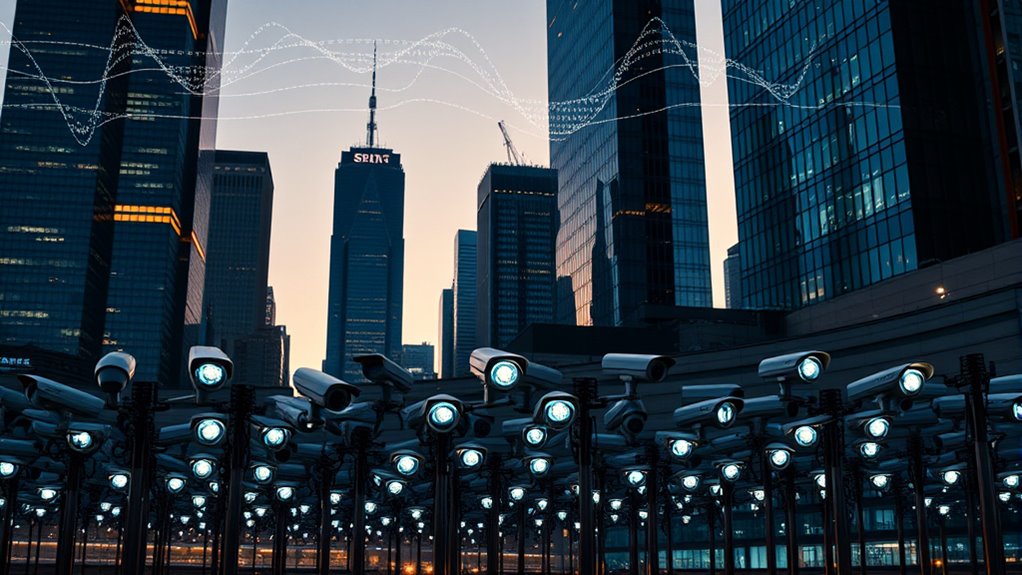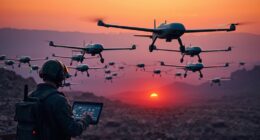After 9/11, you saw a huge expansion in government surveillance, with the Patriot Act granting broad powers to monitor communications and access personal data. New terror-tech like facial recognition and data analysis tools allowed authorities to track you more closely than ever, often without your knowledge. This shift prioritized security but at the cost of your privacy and freedoms, creating a complex balance that continues to evolve. To understand how this all unfolded and the implications, keep exploring further.
Key Takeaways
- The Patriot Act granted broad surveillance powers, enabling monitoring of communications and personal records with minimal oversight.
- Post-9/11 surveillance expanded data collection to include phone calls, emails, social media, and financial info of innocent citizens.
- Terror-Tech innovations like facial recognition and data analytics increased tracking capabilities without user consent.
- These technologies intensified government overreach, raising concerns about accountability, privacy erosion, and civil liberties.
- The expansion of surveillance post-9/11 shifted the balance toward security, often at the expense of personal freedoms and constitutional protections.

In the aftermath of September 11, 2001, surveillance practices dramatically expanded as governments sought to enhance national security. This shift wasn’t just about catching potential threats; it marked a significant increase in government overreach that many citizens didn’t anticipate. You might have felt safer knowing authorities had more tools at their disposal, but this came at a cost. The expanded powers led to widespread privacy erosion, with agencies gathering data on millions of innocent individuals, often without proper oversight or transparency. The Patriot Act, passed shortly after the attacks, became a cornerstone of this new surveillance landscape. It granted government agencies broad authority to monitor communications, access personal records, and conduct searches with minimal judicial oversight. While intended to prevent future attacks, it blurred the lines between security and civil liberties. As a result, your privacy could be compromised simply because of your associations, online activity, or even your location.
You might not realize just how much your daily life became intertwined with government surveillance under this legislation. Your phone calls, emails, social media activity, and even your financial transactions became potential targets for monitoring. The government argued these measures were necessary to detect and dismantle terrorist networks before they could strike again. However, critics warned that such extensive data collection often targeted individuals with no suspicion of wrongdoing, leading to a chilling effect on personal freedoms. Over time, this practice contributed to a culture of distrust, where ordinary citizens felt they were constantly being watched. The erosion of privacy wasn’t just about data collection; it also meant that your constitutional rights—like protection against unreasonable searches and seizures—were often sidestepped in the name of national security.
You may have wondered whether these surveillance programs truly made the country safer or simply expanded government powers at the expense of personal freedoms. The rise of terror-tech, including sophisticated data analysis tools and facial recognition, further fueled this trend. These technologies allow authorities to track and analyze behaviors on an unprecedented scale, often without your knowledge or consent. While they can be effective in identifying threats, they also raise serious questions about oversight, accountability, and the potential for abuse. The balance between security and privacy continues to tilt, with many feeling that government overreach has become an accepted norm rather than an exception. Ultimately, the post-9/11 surge in surveillance has reshaped your relationship with privacy, transforming it into a commodity that can be traded for the promise of safety—often without your explicit consent or awareness.
Frequently Asked Questions
How Has Surveillance Technology Evolved Since the Patriot Act?
Since the Patriot Act, surveillance technology has evolved considerably. You see algorithm enhancements that make data analysis faster and more accurate, helping authorities identify threats more effectively. At the same time, data anonymization techniques protect privacy by hiding personal details, allowing for safer data sharing. This progress enables you to benefit from improved security while also respecting individual privacy, reflecting a more sophisticated and balanced approach to surveillance.
What Are the Privacy Implications for Ordinary Citizens?
Like a net slowly tightening, modern surveillance raises serious privacy concerns for you. You might feel your citizen privacy is compromised as governments and corporations collect data more easily than ever. With advanced tech, your online activities, conversations, and even location can be monitored without your knowledge. This ongoing surveillance can erode trust and make you more vulnerable, highlighting the urgent need to balance security with protecting your fundamental privacy rights.
How Effective Has Surveillance Been in Preventing Terrorism?
You might wonder how effective surveillance truly is in stopping terrorism. An effectiveness assessment shows that while surveillance can help identify threats and disrupt plots, it’s not foolproof. It’s just one part of broader counterterrorism strategies. You should recognize that some attacks still happen despite extensive monitoring, suggesting that surveillance complements other efforts but doesn’t guarantee prevention. Your understanding of these measures helps appreciate their role and limitations.
Are There Any Legal Challenges to Post-9/11 Surveillance?
You might think the government has free rein, but legal hurdles and judicial challenges keep it in check. Courts have questioned the constitutionality of certain surveillance measures, arguing they infringe on privacy rights. These judicial challenges serve as a reminder that even in the fight against terror, there’s still a legal line to respect. So, yes, there are ongoing legal battles that question just how far surveillance can go without overstepping.
What Future Developments Are Expected in Terror-Tech Surveillance?
Looking ahead, you can expect terror-tech surveillance to evolve with biometric advancements and AI integration. These technologies will likely enhance data collection, facial recognition, and behavioral analysis, making detection more precise. You’ll see increased use of machine learning algorithms to predict threats before they happen, raising privacy concerns. As these tools develop, it’s essential to balance security needs with individual rights, ensuring ethical standards keep pace with technological progress.
Conclusion
You’ve watched as the Patriot Act turned surveillance into an unyielding net, tightening around every corner of life. Like a floodgate left open, this wave of terror-tech keeps flowing, reshaping privacy into a distant memory. While protecting you from threats, it also risks drowning your freedoms in the rising tide. As this storm rages on, remember: balance is the lighthouse guiding us through these turbulent waters, reminding us to guard both safety and liberty.








